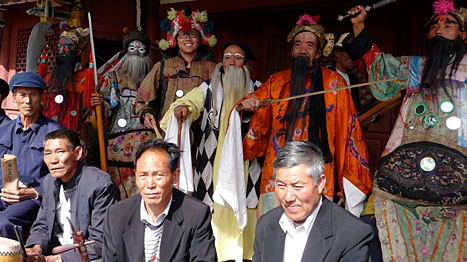In 2001, the World Monument Fund placed the Shaxi market on its list of 101 Most Endangered Sites, and a US$1.3 million rehabilitation project breathed life into the town square. The square's centerpiece is a Qing-Dynasty stage, a tiny raised wooden platform with elaborately painted ceiling beams and supports, built 1795-1850.
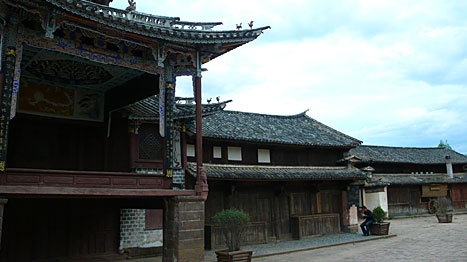
There's a buzz of excitement in Shaxi as the Shilong Chun Opera Troupe are slated to perform Yunnanese opera on the old stage. We head to Shibaoshan to get to Shilong Chun, where the musicians are waiting for us at the village square. These guys (strangely, no women) are of the Bai minority and have a wizened, nonchalant look about them. They are old pros and strike me as Yunnan's answer to the Buena Vista Social Club. They sit around, light pipes, smoke and start playing music. It doesn't take long for me to get dragged into proceedings, a paper cup filled with tea in one hand, a cigarette in the other.
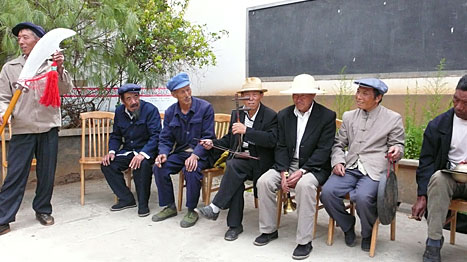 There are three percussion instruments (drum, gong, and cymbal), two string, one wind (pipe), and plenty of singers/performers. The music cranks up, the pipes wail, the strings flail and percussion tops it all off with a crash-and-bang layer. The two theatre directors read from tattered script books and give cues and prompts to the performers. The performance involves characters walking around in circles and twirling wooden poleaxes and swords, over intense monologue-style singing. The story is typical: a plot to overthrow the emperor, good general, bad general, fighting and making up at the end.
There are three percussion instruments (drum, gong, and cymbal), two string, one wind (pipe), and plenty of singers/performers. The music cranks up, the pipes wail, the strings flail and percussion tops it all off with a crash-and-bang layer. The two theatre directors read from tattered script books and give cues and prompts to the performers. The performance involves characters walking around in circles and twirling wooden poleaxes and swords, over intense monologue-style singing. The story is typical: a plot to overthrow the emperor, good general, bad general, fighting and making up at the end.
To be honest, they aren't really great. The musicians make up for their lack of skill with enthusiasm and they more than occasionally go just a little bit off kilter. The actors move in a stilted fashion and haven't entirely memorised their lines. Still, they are extremely friendly and willing to let me try anything. They patiently try to teach me (using hand gestures and broken Mandarin) how to not mangle their instruments.
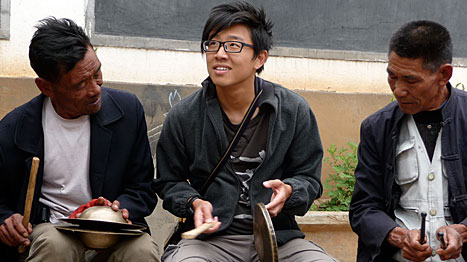
Singing isn't my forte, so I end up picking up the gong. It looks easy enough: just bang the wooden stick in the middle of the gong. 'Don't go too fast or too slow and take my cue,' the main percussionist tells me.
We depart in a convoy of minivans to Shaxi's old stage. It's the troupe's first time performing on the stage, and spirits are not dampened by the rain that starts to fall over the square. The performers begin their setup and get dressed, make up and all. They deck me out in a general's costume that has been handed down over 100 years (and smells like it too). As we start to perform, the rain stops and the sun breaks through the clouds.
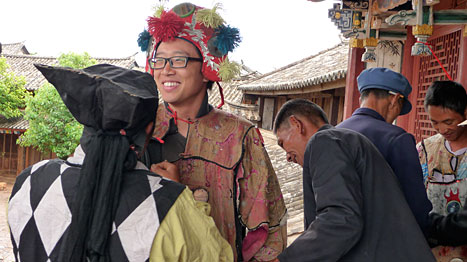
A crowd gathers. The music cranks up. I perform ably and strike my gong according to the cue of the lead percussionist. The other musicians give me their nod of approval. I'm grateful I can keep a basic rhythm. The directors speaks lines softly, the actors pause and listen a moment before wailing them out. They are clumsy and constantly bump into me (at one point knocking over my gong). The performance finishes after forty-five minutes. Half the crowd claps in excitement, the other half have a puzzled look on their faces: as if they aren't sure if the performance was so bad it was good.
